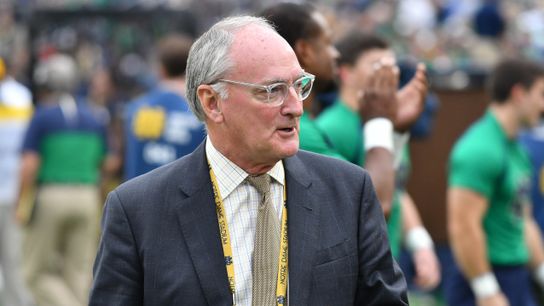Notre Dame Athletics Director Jack Swarbrick, member of the College Football Playoffs four-person working group that's advancing a 12-team playoff proposal, said expanding the championship path for more teams is a critical component for the future of the sport.
Swarbrick also called on athletics programs to place greater emphasis on elevated scheduling components that would reflect in more attractive matchups in college football and also be reflected in the strength-of-schedule metrics for potential CFP participants.
“Very,” Swarbrick said when asked the importance of college football creating a wider postseason championship path. “The first is that football players have such a smaller opportunity to participate in the postseason than their peers. Most college sports, you have a 21 to 24-percent chance of being in the postseason. In football (at the Football Bowls Subdivision level), you've got a 3-percent chance [of making the current, four-team playoffs).
“And going to a bowl game is not substitute for that. You want to try and play for a championship. So expanding, finding a way to expand that opportunity, became very important to us.
“Closely related to that was recognizing the obligation to strengthen the game, not just your part of the game,” Swarbrick said of the CFP working group's approach. “(It's a) very deliberate choice to say the six highest-ranked conference champions, not the Power 5 conference champions plus one was really about that.
“And about saying to all the conferences, you've got something to play for.”
In its current iteration, the CFP accepts four teams into its end-of-season tournament; there are 129 Football Bowls Subdivision programs.
In college basketball, for example, 68 of 350 teams can gain entrance into the sport's March Madness tournament, or nearly 20%.
Additionally, Swarbrick urged a continued elevation in the scheduling of compelling, intersectional games across the sport.
There are multiple, marquee-type non-conference matchups this fall in college football – Clemson-Georgia, Oregon-Ohio State, Auburn-Penn State, Notre Dame-Wisconsin – but still not enough, Swarbrick said.
“It is my fervent hope that if the Playoffs expand, it increases the incentive to have a difficult strength of schedule,” Swarbrick, Notre Dame's A.D. since 2008, said. “To deal with your strength of schedule. Because I don't think that there's enough of that going on in college football right now. I appreciate that there's a lot more of that happening than there was; when you look at the games some of the best teams have scheduled in the past year, it's great. We're seeing it. But we need more of it. College football needs more marquee games.”
Swarbrick also explained Notre Dame's decision to voluntarily remove itself from consideration for a bye – if an expanded playoff model is adopted – due to its return to independent status after a one-year football cooperative with the Atlantic Coast Conference.
“It was borne largely of two things: One was the need to reflect the dynamic that already existed in the selection procedures to reward conference championships. This was part of what the CFP was founding on,” Swarbrick said.
“So, in this (12-team) model, how do you do it? It became part of the question. So, that was one.
“From my perspective, of potentially greater importance was, I had become so frustrated by the discussion about 12 versus 13 games and what we needed to do. This just took that off the table.
“By the time we get to the January 1 round, we will have played the same amount of games as whoever we are playing. That's the way it should be. I just wanted to get rid of that issue.”
